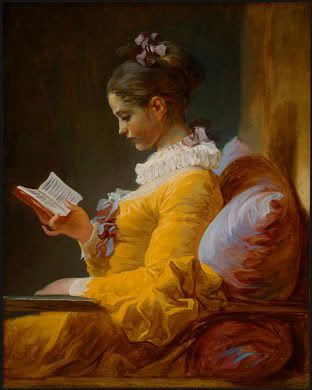 (image is A Yong Girl Reading by Jean Honoré Fragonard (1732-1806) via Guarda chi legge)
(image is A Yong Girl Reading by Jean Honoré Fragonard (1732-1806) via Guarda chi legge)Well, I am home sick again today. I hardly ever take a day off sick. In fact, I hardly ever take a day off period - occupational hazard. I have checked my email remotely and the like. I have my laptop and could be working on the paper I should have finished, but I figure my brain is tired and busy fighting what ever bug it is that has taken up residence in my throat.Plus, I feel like death warmed over. The least I can do though is catch up with my record of what I have been reading... because I have. Been reading. If I don't write it down I feel like I will forget.
6. The Pharmacist's Mate by Amy Fusselman - I bought this book because of the rave review by Zadie Smith and the cover by Marcel Dzama. It is short but moving book. It is a memoir of sorts. She is breathtakingly honest. She grapples with her father's death - the titular Pharmacist's Mate, having been rejected by the Navy because he was in medical school, and doctors were needed, he signed up for the Merchant Marine and ended up in the dispensary - and her and her husband's quest to conceive a child. She intersperses her life, her grief, with excepts of her father's journal while at sea. This is a little gem.
7. The Troll Garden by Willa Cather. This is a book of short stories I bought at the U of T bookstore because a) it was some ridiculously nominal price, like $2 and b) I had not read any of her work, so I thought I might as well. It is one of those University Press editions with erudite introductions. I did not read all of the introduction, because while part of it was helpful, it was bent on systematically spoiling every plotline of everything she ever wrote. The stories themselves are mainly about artists and rustics, civilization and rural existence. They are not vastly different from contemporaries such as, for instance, Henry James.
8. Tortoise by Peter Young. This is a cultural history of the tortoise. A bit Anglo-centric, light on science, heavy on history. I learned some interesting things.
9. The Brie Wonderous Life of Oscar Wao by Junot Díaz. This book is as good as they say. Read it. Oscar, is an overweight, hapless, scifi-obsessed Dominican nerd, living in New Jersey. Sadly for Oscar, he is not one of those nerds who are oblivious to women- no, Oscar loves women. This is an incredible story. It is the story of Oscar, and his family - his mother, and how and why she left the Dominican Republic, his sister, his abuela, interwoven with the history of the island and its fukú (or curses), violence, love and tragedy. And golden-eyed mongoose. The story is told by a narrator who eventually becomes part of the story and relates the story as Oscar himself might think, in scifi, pop culture metaphors and extensive footnotes- in a gripping, high-energy style. Later part of the story is told by his sister. What I know about the Dominican Republic and its former, brutal, dictator, "the failed cattle theif", El Jefe, Trujillo, I learned from Mario Vargas Llosa's The Feast of the Goat, a novel referenced a few times here, and which I will never forget. This novel explains more of what happened to some people in this community after Trujillo, those who immigrated and those who remained, and how the country is still recovering. Mostly, though, it is about individuals. This novel, amazingly, is about love.
10. The Enchantress of Florence by Salman Rushdie. It took a little while for me to get into this novel, but once I did I was hooked. It weaves together Florence under the Medicis with the Mughal Emperor's court. A tall, yellow-haired man in a magician's coat, decorated with lozenges and filled with hidden pockets, arrives at the Mughal court, to deliver a message, tell a story and claim kinship. The story is about what is real, what is make-believe, east and west, religious tolerance, love, beauty, treachery, family and friends. Not 14 pages in, we have Scottish pirates, with what some on the f-list might call slashy angst, and the rollicking tale goes on from there. An enjoyable read.
11. Cloud Atlad by David Mitchell. I got this book on the suggestion of
12. Scribbling the cat by Alexandra Fuller (author of Don't let's go to the dogs tonight). Scribbling is African slang for killing, as in curiosity scribbled the cat. The hero of the memoir, Bobo, is home in Zambia, visiting her parents (her husband and children, safe in Montana), where she meets their neighbour K. He is a veteran of the wars of the region. He fought in one of the elite corps for the Rhodesians and also for the Portuguese in Mozambique. Bobo gets it into her head that the two of them could return to where he fought these wars. She wants to understand what could make this violent, estranged, born again man. He, for his part, thinks he is in love with her. The narrative voice is strong and recognizable from her last memoir. I am not sure what this will all tell us.... People are rotten? War changes people irreparably? Yet, in some senses, some people (especially men) thrive on it.

No comments:
Post a Comment